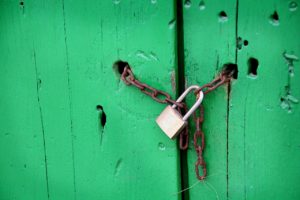
If you make your webbook available to everyone without payment, you don’t necessarily have a security problem except perhaps for copyright infringement. In other words, because the webbook is free, you don’t have to keep anybody from using it.
If you want to limit access to your webbook, though, you must institute some sort of security. There are several ways to do this, but perhaps the simplest is just to make the book accessible only by using a password (read Chapter 18).
Security Within a Webpage
You can place HTML markups and JavaScripts within a webpage that prevent a user from doing almost anything. For instance, there are JavaScripts to prevent a user from printing a webpage. These preventions work to keep most readers from doing the prohibited action. Unfortunately, knowledgeable people can easily get around such preventions, and you cannot thereby achieve complete security.
Nonetheless, the more work you make for someone to print your webpages (or whatever you don’t want them to do), the less likely it is that they will make the effort to do the unauthorized act. So whatever you can come up with (e.g., a JavaScript, to place in a webpage to prevent somebody from doing something you don’t want them to do), go ahead and take the trouble to do it.
Compared to Other Formats
To copy a PDF, ebook, or bookapp one needs only to copy one file. If one can get around any security protection (apparently easy to do if it exists), one can pirate and distribute such a book easily.
But your webbook is more difficult to pirate. One needs to copy all the webpage files, copy all the media files, and bundle them together in a way that’s easy for people to use them (i.e., as a local website). This can take a lot of work, and there is the problem of getting users to use a local website (see Chapter 5).
One can also pirate your webbook files and set up a webbook under another domain name. That is easy to detect, however, via searching the web.
Copyright
The copyright of your webbook contributes to security in that it’s a deterrent to someone who might pirate your webbook and republish it or pirate a portion of your content for republication. Most digital pirates look for easy prey, not for trouble. If you will likely take aggressive measures to protect your copyright, it’s likely you will have fewer pirating problems (read Chapter 20).
Http and Https
The normal unsecure transmission of webpages uses the http protocol. It’s better to use the https protocol, which encrypts the transmission thereby creating more security (a defense against hackers). Not too long ago Google, in effect, required webmasters to use the https protocol to get a higher ranking in the Google search engine. Consequently, many web host providers converted their protocol to https as a new standard service. Don’t overlook this trend when setting up your webbook.
Other Measures
There many things you can do to make your webbook safe from hackers. Your web host provider likely does many of them for you. Such techniques are beyond the scope of this webbook, and it’s up to you to become aware and stay aware of security threats and the techniques to counteract them. And make sure your web host provider uses such techniques on your behalf.